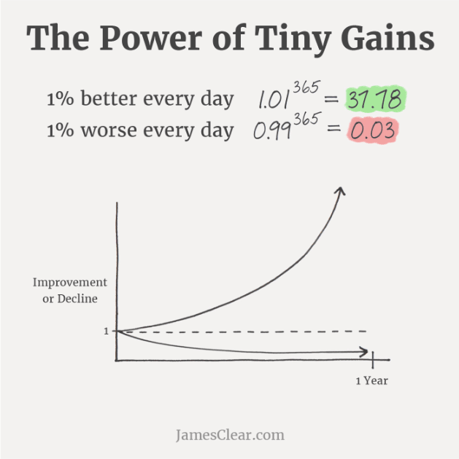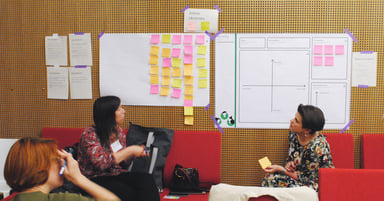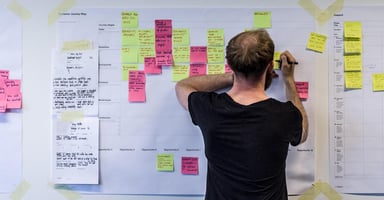How Can You Benefit From the One-Percent Improvement Approach: 9 Practical Tips From a Project Manager

When is this approach worth checking out?
- If you have trouble motivating yourself on a daily basis and you are not committed enough to your everyday activities.
- You have a bunch of big resolutions you never achieved due to a lack of motivation.
- You struggle with starting something new or developing a new habit, for example, starting jogging or a healthy diet.
- You generally feel disorganized and lost in your mind full of ideas and goals.
Even if none of those cases fully apply to you, don't rush to move on to the next chapter – I bet you can still benefit from the one-percent improvement approach.
The general rule you need to know is that you need to focus on steady progress in the long term, instead of making big plans all at once. We always think of success as a single event. In general, we don't recognize the fact that all the wins are the result of a repetitive, long, determined routine based on right (and often small) decisions.
The very first thing I would recommend that you start with is making small improvements to your habits every day instead of trying to make radical changes in a short amount of time. Each day, focus on doing something 1% better in the field you would like to achieve your goal. Instead of promising yourself to start jogging ten kilometers every day, just start with one kilometer or two. Instead of putting all the junk food in the trash and promising yourself to eat only veggies till the end of your life, have one good and healthy meal a day. And then turn it up to two. After a while, eating healthy food will be as easy as breathing, as it will have become a habit. Work-related examples: if you would like to improve your English vocabulary, but you don't have much time to attend a course, start by learning one new word every day. Perhaps you would like to dig into a new technology, but you can't find enough time for it in your busy schedule? Maybe you could simply try to read one article from a field of your choice during your 15-minute morning coffee break?
You probably won't notice any difference at the beginning, but it will make an impact in the long run. Making one-percent better decisions every day for a year will result in being multiple times more efficient by the end of the year. Whereas if you make decisions that are one percent worse, the progress will be decreasing to zero. How cool is that?
There are more tips I prepared about how you can become a productivity guru:
- Get things done framework. It is based on the idea that you need to split your long-term goals and big tasks into subtasks and complete them in the order. Example:
Sell the car [Project]
- Wash the car- Take some photos of the car from every possible angle
- Browse ads about the same model and get a price estimate for the car
- Call the mechanic (Trevor: 1-2333-4440) and ask him about important facts about the car that should be mentioned in the ad
- Put the ad on www.sellyourcar.com
- Create an “Inbox” space where you will put all your ideas (projects) and tasks that crop up, so you can get them out of your system. The Inbox can be either a notebook, an app, or even a plastic box. Just keep it as available and as simple as possible. Review your projects every week and make sure all of them have at least one subtask you can complete during the week. If there are actions or subtasks which require less than 5 minutes to complete, deal with them immediately and move forward to the next subtask.
- A nice way of keeping your motivation high is to find 15-20 minutes to review the past and upcoming week. There is a structure you can use:
- List your wins
- Write down lessons you’ve learned
- Think of things you can share
- Remind yourself what are you happy with
- Set goals for the next week
- A significant part of your productivity improvement will require you to get rid of the irrelevant information that floods your mind every day via social media, emails, Slack, etc. There are a number of things that often create redundant noise, and I’d like you to check out tips on how you can get rid of them:
- Following people on social media
- Unfollow people who create too much noise and don’t share relevant content.
- Slack channels
- Leave the channels you don’t need anymore and turn off notifications in those that don’t require your constant attention. Create a daily slot or two to check out the snoozed channels just to be up to date with all the information posted.
- Subscriptions
- If there are any subscriptions that you are no longer interested in, don’t archive the emails – unsubscribe instead.
- Following people on social media
- Follow people who share valuable content that inspires you. Read books related to areas you are curious about. Use the greatest feature of the 21st century, which is free knowledge for everyone.
- While doing your daily routine in the morning, set the priorities for the three most important tasks you need to do this day. Write them down and start with the most important one.
- Ask people about their experience and their path of achieving goals. There’s no better way of choosing an optimal way of learning about the obstacles other than asking people who’ve done it already.
- Have a growth mindset and believe that your knowledge, intelligence, and talent will grow as you gain experience. Don’t think about what people have in their minds, just put your energy into learning straight away.
- Take care of your health (mental and physical) and your sleep schedule. Remember that tiredness and discomfort are the enemies of productivity, and they might have a massive impact on the way you behave and the way you treat the world surrounding you.
At Netguru, we tend to share tips and tricks about productivity time-management. We care about those things a lot and our goal is to share our knowledge with the whole world. You'll find more of our observations and insights on our PM stories blog. Please share your insights with us!

















.jpg?width=384&height=202&name=Netguru-Biuro-2018-6425%20(1).jpg)







